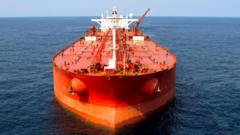With the outbreak of hostilities between Israel and Iran, the price of oil has surged significantly, causing alarm across the financial markets. Following reports of Israeli airstrikes targeting Iran, Brent crude oil prices saw a spike of over 10%, reaching levels not seen this year, as traders responded to the potential threat to oil supplies from the volatile region.
As of this latest update, Brent crude was trading at approximately $74.47 a barrel, still 5% higher than the previous closing value. Despite this increase, prices remain over 10% lower than they were last year, and far below the spikes observed early in 2022 amidst the Russia-Ukraine conflict, when oil prices soared past $100 a barrel.
Market impacts were felt around the globe, with major stock indices in Asia and Europe posting notable declines—Japan's Nikkei index fell by 0.9%, while the UK's FTSE 100 lost 0.3%. In the US, the Dow Jones and S&P 500 reported drops of 1.5% and 0.8%, respectively. Investors have shifted to "safe haven" assets like gold, which experienced a rise of 1.2% to $3,423.30 per ounce.
In the face of this conflict, analysts express caution. Energy traders are keenly monitoring the situation, with some suggesting that the potential for a larger war could impact oil supplies significantly. Observers from Capital Economics warn that if Iran's production facilities were compromised, Brent crude prices could escalate to between $80 and $100 per barrel. However, they also note that such a surge could prompt increased output from other oil producers, potentially stabilizing market prices.
UK motoring body the RAC has indicated that while it is impossible to predict how this volatility will affect petrol prices, key factors include the sustainability of these oil prices over time and retailers’ profit margins.
The situation could reach a critical point; if Iran were to disrupt oil shipping in the strategically vital Strait of Hormuz, which sees around 20% of the world’s oil transit, it could unleash higher prices and economic repercussions globally. Financial analysts predict that with ongoing developments, markets will need to adjust rapidly to the evolving risks.
As of this latest update, Brent crude was trading at approximately $74.47 a barrel, still 5% higher than the previous closing value. Despite this increase, prices remain over 10% lower than they were last year, and far below the spikes observed early in 2022 amidst the Russia-Ukraine conflict, when oil prices soared past $100 a barrel.
Market impacts were felt around the globe, with major stock indices in Asia and Europe posting notable declines—Japan's Nikkei index fell by 0.9%, while the UK's FTSE 100 lost 0.3%. In the US, the Dow Jones and S&P 500 reported drops of 1.5% and 0.8%, respectively. Investors have shifted to "safe haven" assets like gold, which experienced a rise of 1.2% to $3,423.30 per ounce.
In the face of this conflict, analysts express caution. Energy traders are keenly monitoring the situation, with some suggesting that the potential for a larger war could impact oil supplies significantly. Observers from Capital Economics warn that if Iran's production facilities were compromised, Brent crude prices could escalate to between $80 and $100 per barrel. However, they also note that such a surge could prompt increased output from other oil producers, potentially stabilizing market prices.
UK motoring body the RAC has indicated that while it is impossible to predict how this volatility will affect petrol prices, key factors include the sustainability of these oil prices over time and retailers’ profit margins.
The situation could reach a critical point; if Iran were to disrupt oil shipping in the strategically vital Strait of Hormuz, which sees around 20% of the world’s oil transit, it could unleash higher prices and economic repercussions globally. Financial analysts predict that with ongoing developments, markets will need to adjust rapidly to the evolving risks.



















